AI in Enhancing Feedback Practices
AI in Enhancing Feedback Practices
AI in Enhancing Feedback Practices
Struggling to keep up with feedback demands? Discover how AI can automate tasks, personalize insights, and empower you to deliver impactful feedback.
Struggling to keep up with feedback demands? Discover how AI can automate tasks, personalize insights, and empower you to deliver impactful feedback.
Struggling to keep up with feedback demands? Discover how AI can automate tasks, personalize insights, and empower you to deliver impactful feedback.



Remember the last time you spent hours providing feedback, only to feel like you were drowning in a sea of papers (or emails)?
Revising countless essays, analyzing mountains of customer reviews, or offering performance evaluations can be incredibly time-consuming and leave you feeling burnt out.
Imagine having a tireless assistant by your side, analyzing content, surfacing key insights, and even suggesting improvements.
That's the power of AI in feedback practices. Artificial intelligence (AI) is rapidly transforming the way we provide and receive feedback across various fields.
Increasing Reliance on AI for Actionable, Timely, and Efficient Feedback:
The traditional approach to feedback often involves manual processes that can be slow and inefficient. AI, however, excels at analyzing vast amounts of data quickly and efficiently. It can identify patterns, trends, and areas for improvement within minutes, allowing you to provide more targeted and actionable feedback.
Several key factors drive this shift towards AI-powered feedback:
Increased Demand: In today's fast-paced world, the demand for timely and effective feedback is higher than ever. AI can help us meet these demands by automating repetitive tasks and providing real-time insights.
Data-Driven Approach: AI thrives on data. By leveraging vast datasets, AI systems can identify subtle patterns and correlations that might escape human analysis. This data-driven approach leads to more objective and evidence-based feedback.
Personalization: AI can personalize feedback to individual needs and learning styles. This is particularly beneficial in educational settings, where students can receive targeted guidance based on their strengths and weaknesses.
Evolution of AI in Feedback Generation:

The application of AI in feedback practices has seen significant advancements in recent years. Let's explore some of the exciting developments:
Sophisticated AI Technologies: Tools like GPT-4, a powerful language model, are making waves in the education sector. These AI systems can analyze student writing and provide personalized grammar, style, and clarity feedback.
This frees up educator’s time to focus on more complex aspects of teaching, like providing individual guidance and fostering critical thinking skills.Impact on Content Creation and Customer Service: AI transforms content creation by offering real-time suggestions and feedback on grammar, plagiarism, and effectiveness. This empowers writers and editors to produce high-quality content efficiently.
Similarly, in customer service, AI-powered chatbots can analyze customer interactions, provide initial feedback, or suggest solutions to common problems. This streamlines customer service processes and improves overall customer satisfaction.Beyond Textual Feedback: The reach of AI feedback extends beyond written content. AI systems are being developed to analyze visual content, such as design elements or product images. This allows for automated feedback on aesthetics, layout, and user experience, helping designers and product developers refine their creations.
These advancements highlight the growing versatility of AI in feedback generation. We can expect even more innovative applications across diverse fields as AI technology evolves.
Next, we'll delve into the concrete benefits of implementing AI for feedback in your workflow.
Benefits of Implementing AI for Feedback:
Integrating AI into your feedback practices can unlock a treasure trove of advantages. Let's explore some of the most compelling benefits:
Automation of Repetitive Tasks: Its time for you to say goodbye to the tedious process of manually grading essays or analyzing customer reviews. AI excels at automating these repetitive tasks, freeing up your valuable time and energy.
This allows you to focus on higher-level strategic thinking, fostering creativity and providing in-depth feedback where it truly matters.Enhanced User Experience: AI can significantly enhance the user experience by identifying areas for improvement and suggesting solutions.
In educational settings, AI-powered feedback systems can highlight areas where students might be struggling and provide targeted resources or exercises.
Similarly, in customer service, AI can analyze customer interactions and suggest solutions to common problems, leading to faster resolution times and increased customer satisfaction.Real-Time Tracking and Actionable Insights: Gathering feedback often involves a delay. AI bridges this gap by providing real-time data and insights.
This allows for immediate course correction and continuous improvement. Imagine receiving feedback on student progress throughout the semester or gauging customer sentiment within hours of a product launch.
This empowers you to make data-driven decisions and refine your products, services, or teaching methods based on real-time feedback.Personalization at Scale: AI can personalize feedback to individual needs and learning styles. This is particularly beneficial in large classrooms or businesses with a vast customer base.
AI can analyze individual data points and tailor feedback accordingly, ensuring each student or customer receives the most relevant and impactful guidance.
Challenges and Limitations of AI in Feedback:

While AI offers a wealth of benefits for feedback practices, it's important to acknowledge some potential challenges and limitations:
Meaningfulness and Authenticity: A common concern surrounding AI-generated feedback is its lack of human touch.
Can a machine truly understand the nuances of human communication and provide feedback that resonates with the recipient?
While AI can excel at identifying patterns and suggesting improvements, it may struggle to capture the deeper meaning or intent behind the content.
Human Oversight Remains Crucial: AI should be seen as a powerful tool, not a replacement for human expertise.
Effective feedback often requires empathy, critical thinking, and adapting to individual needs. Human judgment remains essential in interpreting AI-generated insights and tailoring them to specific contexts.
Addressing AI Biases and Inaccuracies: AI systems are trained on data sets, and these data sets can sometimes be biased. This can lead to AI-generated feedback reflecting those biases, potentially hindering its effectiveness or causing harm.
It's crucial to be mindful of potential biases and monitor AI performance to ensure fair and accurate feedback.
Despite these challenges, AI offers a valuable tool for enhancing feedback practices.
AI can be a powerful tool, but it can also be confusing. Metaform makes it easier to use AI for customer feedback in a clear and helpful way. They help you understand your customers better to create even better experiences for them.
You can try the free trial to start experiencing the difference!
Strategies for Effective AI-Generated Feedback:
To maximize the value of AI in your feedback practices, consider these key strategies:
Crafting Effective AI Prompts: The quality of AI-generated feedback hinges on the clarity and specificity of your prompts.
Imagine you're providing instructions to a helpful assistant. The more precise your instructions, the more targeted and insightful the feedback will be.
For example, instead of a generic prompt like "provide feedback on this essay," consider specifying areas you'd like AI to focus on, such as grammar, clarity, or argument structure.A Balanced Approach: Human + AI Collaboration: AI and human expertise are best utilized together.
AI excels at identifying patterns and suggesting improvements, while humans bring critical thinking, empathy, and the ability to tailor feedback to specific situations.
Leverage AI's analytical power to generate initial insights, then use your human judgment to refine and personalize the feedback for maximum impact.Clear Guidelines for AI-Based Feedback: When incorporating AI-generated feedback into your workflow, ensure clear guidelines accompany it.
This helps recipients understand the source of the feedback, its limitations, and how best to utilize it.
For instance, explain that AI flagged a potential grammar issue, but a human reviewer should confirm its accuracy before suggesting corrections.
By following these strategies, you can ensure AI-generated feedback is a valuable asset in your toolkit, not a black box delivering cryptic messages.
Case Studies and Research on AI-Driven Feedback Tools:
Seeing is believing! Let's delve into some compelling case studies and research that demonstrate the effectiveness of AI-powered feedback tools:
Stanford University and Improved Teaching Practices:
Stanford researchers investigated how AI feedback tools could empower educators. The study found that AI could analyze student work and provide instructors with valuable insights into student comprehension and areas needing improvement.
Armed with this data, educators could tailor their teaching approaches to address specific student needs, ultimately leading to more effective learning outcomes.
Harvard Graduate School of Education:
Building on the promise of AI in education, Harvard Graduate School of Education conducted a study exploring the impact of AI feedback on student learning.
The research highlighted that AI could provide timely and personalized feedback on student writing, allowing them to identify weaknesses and improve their skills more effectively.Writable: Personalized Feedback for Student Success:
Companies like Writable are putting AI-powered feedback into action. Writable's platform utilizes AI to analyze student writing and provide personalized grammar, clarity, and style feedback.
This empowers students to become more confident and effective writers, fostering a positive learning experience.
These are just a few examples of how AI feedback tools are making waves across various sectors. As AI technology continues to evolve, we can expect even more innovative applications to revolutionize how we provide and receive feedback.
Future Prospects of AI in Feedback Practices:
The future of AI in feedback practices is brimming with exciting possibilities. Here's a glimpse of what lies ahead:
Seamless Human-AI Collaboration:
Imagine a future where humans and AI work hand-in-hand to generate insightful and impactful feedback. AI will continue refining its ability to analyze data and identify patterns, while humans will provide empathy, critical thinking, and context-specific guidance. This seamless collaboration will lead to a new era of personalized and effective feedback.Adapting to Evolving Needs:
The beauty of AI lies in its adaptability. AI feedback mechanisms will adapt as educational needs, customer service demands, and professional development requirements evolve.
AI systems will be able to learn and adjust their feedback models to address the ever-changing needs of various stakeholders.Potential Applications in Diverse Fields:
The reach of AI in feedback extends far beyond education and customer service. We can expect to see AI-powered feedback tools revolutionize various fields, including:Professional Development: AI can analyze an individual's performance data and suggest areas for improvement, leading to more targeted professional development opportunities.
Creative Industries: AI feedback systems could analyze artistic creations and offer suggestions for refinement, empowering artists and designers to hone their craft.
Healthcare: AI-powered feedback tools could analyze medical data and provide feedback to healthcare professionals, aiding in diagnosis and treatment planning.
The possibilities are truly limitless. As AI technology continues to evolve, we can expect even more innovative applications to reshape how we provide and receive feedback across all aspects of our lives.
Conclusion:
AI has undeniably made significant advancements in feedback practices. From automating repetitive tasks to providing personalized insights, AI offers many benefits.
However, it's crucial to remember that AI should be seen as a tool to enhance human expertise, not replace it. By strategically integrating AI with human oversight and continuously refining AI algorithms, we can unlock the full potential of AI-driven feedback for a future of more effective learning, improved customer experiences, and overall growth across various fields.
Let's embrace ongoing research and development in this exciting domain and empower ourselves with the power of AI-driven feedback for the future.
Amplify your feedback with cutting-edge AI. Visit us to start your free trial and see the difference.
Remember the last time you spent hours providing feedback, only to feel like you were drowning in a sea of papers (or emails)?
Revising countless essays, analyzing mountains of customer reviews, or offering performance evaluations can be incredibly time-consuming and leave you feeling burnt out.
Imagine having a tireless assistant by your side, analyzing content, surfacing key insights, and even suggesting improvements.
That's the power of AI in feedback practices. Artificial intelligence (AI) is rapidly transforming the way we provide and receive feedback across various fields.
Increasing Reliance on AI for Actionable, Timely, and Efficient Feedback:
The traditional approach to feedback often involves manual processes that can be slow and inefficient. AI, however, excels at analyzing vast amounts of data quickly and efficiently. It can identify patterns, trends, and areas for improvement within minutes, allowing you to provide more targeted and actionable feedback.
Several key factors drive this shift towards AI-powered feedback:
Increased Demand: In today's fast-paced world, the demand for timely and effective feedback is higher than ever. AI can help us meet these demands by automating repetitive tasks and providing real-time insights.
Data-Driven Approach: AI thrives on data. By leveraging vast datasets, AI systems can identify subtle patterns and correlations that might escape human analysis. This data-driven approach leads to more objective and evidence-based feedback.
Personalization: AI can personalize feedback to individual needs and learning styles. This is particularly beneficial in educational settings, where students can receive targeted guidance based on their strengths and weaknesses.
Evolution of AI in Feedback Generation:

The application of AI in feedback practices has seen significant advancements in recent years. Let's explore some of the exciting developments:
Sophisticated AI Technologies: Tools like GPT-4, a powerful language model, are making waves in the education sector. These AI systems can analyze student writing and provide personalized grammar, style, and clarity feedback.
This frees up educator’s time to focus on more complex aspects of teaching, like providing individual guidance and fostering critical thinking skills.Impact on Content Creation and Customer Service: AI transforms content creation by offering real-time suggestions and feedback on grammar, plagiarism, and effectiveness. This empowers writers and editors to produce high-quality content efficiently.
Similarly, in customer service, AI-powered chatbots can analyze customer interactions, provide initial feedback, or suggest solutions to common problems. This streamlines customer service processes and improves overall customer satisfaction.Beyond Textual Feedback: The reach of AI feedback extends beyond written content. AI systems are being developed to analyze visual content, such as design elements or product images. This allows for automated feedback on aesthetics, layout, and user experience, helping designers and product developers refine their creations.
These advancements highlight the growing versatility of AI in feedback generation. We can expect even more innovative applications across diverse fields as AI technology evolves.
Next, we'll delve into the concrete benefits of implementing AI for feedback in your workflow.
Benefits of Implementing AI for Feedback:
Integrating AI into your feedback practices can unlock a treasure trove of advantages. Let's explore some of the most compelling benefits:
Automation of Repetitive Tasks: Its time for you to say goodbye to the tedious process of manually grading essays or analyzing customer reviews. AI excels at automating these repetitive tasks, freeing up your valuable time and energy.
This allows you to focus on higher-level strategic thinking, fostering creativity and providing in-depth feedback where it truly matters.Enhanced User Experience: AI can significantly enhance the user experience by identifying areas for improvement and suggesting solutions.
In educational settings, AI-powered feedback systems can highlight areas where students might be struggling and provide targeted resources or exercises.
Similarly, in customer service, AI can analyze customer interactions and suggest solutions to common problems, leading to faster resolution times and increased customer satisfaction.Real-Time Tracking and Actionable Insights: Gathering feedback often involves a delay. AI bridges this gap by providing real-time data and insights.
This allows for immediate course correction and continuous improvement. Imagine receiving feedback on student progress throughout the semester or gauging customer sentiment within hours of a product launch.
This empowers you to make data-driven decisions and refine your products, services, or teaching methods based on real-time feedback.Personalization at Scale: AI can personalize feedback to individual needs and learning styles. This is particularly beneficial in large classrooms or businesses with a vast customer base.
AI can analyze individual data points and tailor feedback accordingly, ensuring each student or customer receives the most relevant and impactful guidance.
Challenges and Limitations of AI in Feedback:

While AI offers a wealth of benefits for feedback practices, it's important to acknowledge some potential challenges and limitations:
Meaningfulness and Authenticity: A common concern surrounding AI-generated feedback is its lack of human touch.
Can a machine truly understand the nuances of human communication and provide feedback that resonates with the recipient?
While AI can excel at identifying patterns and suggesting improvements, it may struggle to capture the deeper meaning or intent behind the content.
Human Oversight Remains Crucial: AI should be seen as a powerful tool, not a replacement for human expertise.
Effective feedback often requires empathy, critical thinking, and adapting to individual needs. Human judgment remains essential in interpreting AI-generated insights and tailoring them to specific contexts.
Addressing AI Biases and Inaccuracies: AI systems are trained on data sets, and these data sets can sometimes be biased. This can lead to AI-generated feedback reflecting those biases, potentially hindering its effectiveness or causing harm.
It's crucial to be mindful of potential biases and monitor AI performance to ensure fair and accurate feedback.
Despite these challenges, AI offers a valuable tool for enhancing feedback practices.
AI can be a powerful tool, but it can also be confusing. Metaform makes it easier to use AI for customer feedback in a clear and helpful way. They help you understand your customers better to create even better experiences for them.
You can try the free trial to start experiencing the difference!
Strategies for Effective AI-Generated Feedback:
To maximize the value of AI in your feedback practices, consider these key strategies:
Crafting Effective AI Prompts: The quality of AI-generated feedback hinges on the clarity and specificity of your prompts.
Imagine you're providing instructions to a helpful assistant. The more precise your instructions, the more targeted and insightful the feedback will be.
For example, instead of a generic prompt like "provide feedback on this essay," consider specifying areas you'd like AI to focus on, such as grammar, clarity, or argument structure.A Balanced Approach: Human + AI Collaboration: AI and human expertise are best utilized together.
AI excels at identifying patterns and suggesting improvements, while humans bring critical thinking, empathy, and the ability to tailor feedback to specific situations.
Leverage AI's analytical power to generate initial insights, then use your human judgment to refine and personalize the feedback for maximum impact.Clear Guidelines for AI-Based Feedback: When incorporating AI-generated feedback into your workflow, ensure clear guidelines accompany it.
This helps recipients understand the source of the feedback, its limitations, and how best to utilize it.
For instance, explain that AI flagged a potential grammar issue, but a human reviewer should confirm its accuracy before suggesting corrections.
By following these strategies, you can ensure AI-generated feedback is a valuable asset in your toolkit, not a black box delivering cryptic messages.
Case Studies and Research on AI-Driven Feedback Tools:
Seeing is believing! Let's delve into some compelling case studies and research that demonstrate the effectiveness of AI-powered feedback tools:
Stanford University and Improved Teaching Practices:
Stanford researchers investigated how AI feedback tools could empower educators. The study found that AI could analyze student work and provide instructors with valuable insights into student comprehension and areas needing improvement.
Armed with this data, educators could tailor their teaching approaches to address specific student needs, ultimately leading to more effective learning outcomes.
Harvard Graduate School of Education:
Building on the promise of AI in education, Harvard Graduate School of Education conducted a study exploring the impact of AI feedback on student learning.
The research highlighted that AI could provide timely and personalized feedback on student writing, allowing them to identify weaknesses and improve their skills more effectively.Writable: Personalized Feedback for Student Success:
Companies like Writable are putting AI-powered feedback into action. Writable's platform utilizes AI to analyze student writing and provide personalized grammar, clarity, and style feedback.
This empowers students to become more confident and effective writers, fostering a positive learning experience.
These are just a few examples of how AI feedback tools are making waves across various sectors. As AI technology continues to evolve, we can expect even more innovative applications to revolutionize how we provide and receive feedback.
Future Prospects of AI in Feedback Practices:
The future of AI in feedback practices is brimming with exciting possibilities. Here's a glimpse of what lies ahead:
Seamless Human-AI Collaboration:
Imagine a future where humans and AI work hand-in-hand to generate insightful and impactful feedback. AI will continue refining its ability to analyze data and identify patterns, while humans will provide empathy, critical thinking, and context-specific guidance. This seamless collaboration will lead to a new era of personalized and effective feedback.Adapting to Evolving Needs:
The beauty of AI lies in its adaptability. AI feedback mechanisms will adapt as educational needs, customer service demands, and professional development requirements evolve.
AI systems will be able to learn and adjust their feedback models to address the ever-changing needs of various stakeholders.Potential Applications in Diverse Fields:
The reach of AI in feedback extends far beyond education and customer service. We can expect to see AI-powered feedback tools revolutionize various fields, including:Professional Development: AI can analyze an individual's performance data and suggest areas for improvement, leading to more targeted professional development opportunities.
Creative Industries: AI feedback systems could analyze artistic creations and offer suggestions for refinement, empowering artists and designers to hone their craft.
Healthcare: AI-powered feedback tools could analyze medical data and provide feedback to healthcare professionals, aiding in diagnosis and treatment planning.
The possibilities are truly limitless. As AI technology continues to evolve, we can expect even more innovative applications to reshape how we provide and receive feedback across all aspects of our lives.
Conclusion:
AI has undeniably made significant advancements in feedback practices. From automating repetitive tasks to providing personalized insights, AI offers many benefits.
However, it's crucial to remember that AI should be seen as a tool to enhance human expertise, not replace it. By strategically integrating AI with human oversight and continuously refining AI algorithms, we can unlock the full potential of AI-driven feedback for a future of more effective learning, improved customer experiences, and overall growth across various fields.
Let's embrace ongoing research and development in this exciting domain and empower ourselves with the power of AI-driven feedback for the future.
Amplify your feedback with cutting-edge AI. Visit us to start your free trial and see the difference.
Remember the last time you spent hours providing feedback, only to feel like you were drowning in a sea of papers (or emails)?
Revising countless essays, analyzing mountains of customer reviews, or offering performance evaluations can be incredibly time-consuming and leave you feeling burnt out.
Imagine having a tireless assistant by your side, analyzing content, surfacing key insights, and even suggesting improvements.
That's the power of AI in feedback practices. Artificial intelligence (AI) is rapidly transforming the way we provide and receive feedback across various fields.
Increasing Reliance on AI for Actionable, Timely, and Efficient Feedback:
The traditional approach to feedback often involves manual processes that can be slow and inefficient. AI, however, excels at analyzing vast amounts of data quickly and efficiently. It can identify patterns, trends, and areas for improvement within minutes, allowing you to provide more targeted and actionable feedback.
Several key factors drive this shift towards AI-powered feedback:
Increased Demand: In today's fast-paced world, the demand for timely and effective feedback is higher than ever. AI can help us meet these demands by automating repetitive tasks and providing real-time insights.
Data-Driven Approach: AI thrives on data. By leveraging vast datasets, AI systems can identify subtle patterns and correlations that might escape human analysis. This data-driven approach leads to more objective and evidence-based feedback.
Personalization: AI can personalize feedback to individual needs and learning styles. This is particularly beneficial in educational settings, where students can receive targeted guidance based on their strengths and weaknesses.
Evolution of AI in Feedback Generation:

The application of AI in feedback practices has seen significant advancements in recent years. Let's explore some of the exciting developments:
Sophisticated AI Technologies: Tools like GPT-4, a powerful language model, are making waves in the education sector. These AI systems can analyze student writing and provide personalized grammar, style, and clarity feedback.
This frees up educator’s time to focus on more complex aspects of teaching, like providing individual guidance and fostering critical thinking skills.Impact on Content Creation and Customer Service: AI transforms content creation by offering real-time suggestions and feedback on grammar, plagiarism, and effectiveness. This empowers writers and editors to produce high-quality content efficiently.
Similarly, in customer service, AI-powered chatbots can analyze customer interactions, provide initial feedback, or suggest solutions to common problems. This streamlines customer service processes and improves overall customer satisfaction.Beyond Textual Feedback: The reach of AI feedback extends beyond written content. AI systems are being developed to analyze visual content, such as design elements or product images. This allows for automated feedback on aesthetics, layout, and user experience, helping designers and product developers refine their creations.
These advancements highlight the growing versatility of AI in feedback generation. We can expect even more innovative applications across diverse fields as AI technology evolves.
Next, we'll delve into the concrete benefits of implementing AI for feedback in your workflow.
Benefits of Implementing AI for Feedback:
Integrating AI into your feedback practices can unlock a treasure trove of advantages. Let's explore some of the most compelling benefits:
Automation of Repetitive Tasks: Its time for you to say goodbye to the tedious process of manually grading essays or analyzing customer reviews. AI excels at automating these repetitive tasks, freeing up your valuable time and energy.
This allows you to focus on higher-level strategic thinking, fostering creativity and providing in-depth feedback where it truly matters.Enhanced User Experience: AI can significantly enhance the user experience by identifying areas for improvement and suggesting solutions.
In educational settings, AI-powered feedback systems can highlight areas where students might be struggling and provide targeted resources or exercises.
Similarly, in customer service, AI can analyze customer interactions and suggest solutions to common problems, leading to faster resolution times and increased customer satisfaction.Real-Time Tracking and Actionable Insights: Gathering feedback often involves a delay. AI bridges this gap by providing real-time data and insights.
This allows for immediate course correction and continuous improvement. Imagine receiving feedback on student progress throughout the semester or gauging customer sentiment within hours of a product launch.
This empowers you to make data-driven decisions and refine your products, services, or teaching methods based on real-time feedback.Personalization at Scale: AI can personalize feedback to individual needs and learning styles. This is particularly beneficial in large classrooms or businesses with a vast customer base.
AI can analyze individual data points and tailor feedback accordingly, ensuring each student or customer receives the most relevant and impactful guidance.
Challenges and Limitations of AI in Feedback:

While AI offers a wealth of benefits for feedback practices, it's important to acknowledge some potential challenges and limitations:
Meaningfulness and Authenticity: A common concern surrounding AI-generated feedback is its lack of human touch.
Can a machine truly understand the nuances of human communication and provide feedback that resonates with the recipient?
While AI can excel at identifying patterns and suggesting improvements, it may struggle to capture the deeper meaning or intent behind the content.
Human Oversight Remains Crucial: AI should be seen as a powerful tool, not a replacement for human expertise.
Effective feedback often requires empathy, critical thinking, and adapting to individual needs. Human judgment remains essential in interpreting AI-generated insights and tailoring them to specific contexts.
Addressing AI Biases and Inaccuracies: AI systems are trained on data sets, and these data sets can sometimes be biased. This can lead to AI-generated feedback reflecting those biases, potentially hindering its effectiveness or causing harm.
It's crucial to be mindful of potential biases and monitor AI performance to ensure fair and accurate feedback.
Despite these challenges, AI offers a valuable tool for enhancing feedback practices.
AI can be a powerful tool, but it can also be confusing. Metaform makes it easier to use AI for customer feedback in a clear and helpful way. They help you understand your customers better to create even better experiences for them.
You can try the free trial to start experiencing the difference!
Strategies for Effective AI-Generated Feedback:
To maximize the value of AI in your feedback practices, consider these key strategies:
Crafting Effective AI Prompts: The quality of AI-generated feedback hinges on the clarity and specificity of your prompts.
Imagine you're providing instructions to a helpful assistant. The more precise your instructions, the more targeted and insightful the feedback will be.
For example, instead of a generic prompt like "provide feedback on this essay," consider specifying areas you'd like AI to focus on, such as grammar, clarity, or argument structure.A Balanced Approach: Human + AI Collaboration: AI and human expertise are best utilized together.
AI excels at identifying patterns and suggesting improvements, while humans bring critical thinking, empathy, and the ability to tailor feedback to specific situations.
Leverage AI's analytical power to generate initial insights, then use your human judgment to refine and personalize the feedback for maximum impact.Clear Guidelines for AI-Based Feedback: When incorporating AI-generated feedback into your workflow, ensure clear guidelines accompany it.
This helps recipients understand the source of the feedback, its limitations, and how best to utilize it.
For instance, explain that AI flagged a potential grammar issue, but a human reviewer should confirm its accuracy before suggesting corrections.
By following these strategies, you can ensure AI-generated feedback is a valuable asset in your toolkit, not a black box delivering cryptic messages.
Case Studies and Research on AI-Driven Feedback Tools:
Seeing is believing! Let's delve into some compelling case studies and research that demonstrate the effectiveness of AI-powered feedback tools:
Stanford University and Improved Teaching Practices:
Stanford researchers investigated how AI feedback tools could empower educators. The study found that AI could analyze student work and provide instructors with valuable insights into student comprehension and areas needing improvement.
Armed with this data, educators could tailor their teaching approaches to address specific student needs, ultimately leading to more effective learning outcomes.
Harvard Graduate School of Education:
Building on the promise of AI in education, Harvard Graduate School of Education conducted a study exploring the impact of AI feedback on student learning.
The research highlighted that AI could provide timely and personalized feedback on student writing, allowing them to identify weaknesses and improve their skills more effectively.Writable: Personalized Feedback for Student Success:
Companies like Writable are putting AI-powered feedback into action. Writable's platform utilizes AI to analyze student writing and provide personalized grammar, clarity, and style feedback.
This empowers students to become more confident and effective writers, fostering a positive learning experience.
These are just a few examples of how AI feedback tools are making waves across various sectors. As AI technology continues to evolve, we can expect even more innovative applications to revolutionize how we provide and receive feedback.
Future Prospects of AI in Feedback Practices:
The future of AI in feedback practices is brimming with exciting possibilities. Here's a glimpse of what lies ahead:
Seamless Human-AI Collaboration:
Imagine a future where humans and AI work hand-in-hand to generate insightful and impactful feedback. AI will continue refining its ability to analyze data and identify patterns, while humans will provide empathy, critical thinking, and context-specific guidance. This seamless collaboration will lead to a new era of personalized and effective feedback.Adapting to Evolving Needs:
The beauty of AI lies in its adaptability. AI feedback mechanisms will adapt as educational needs, customer service demands, and professional development requirements evolve.
AI systems will be able to learn and adjust their feedback models to address the ever-changing needs of various stakeholders.Potential Applications in Diverse Fields:
The reach of AI in feedback extends far beyond education and customer service. We can expect to see AI-powered feedback tools revolutionize various fields, including:Professional Development: AI can analyze an individual's performance data and suggest areas for improvement, leading to more targeted professional development opportunities.
Creative Industries: AI feedback systems could analyze artistic creations and offer suggestions for refinement, empowering artists and designers to hone their craft.
Healthcare: AI-powered feedback tools could analyze medical data and provide feedback to healthcare professionals, aiding in diagnosis and treatment planning.
The possibilities are truly limitless. As AI technology continues to evolve, we can expect even more innovative applications to reshape how we provide and receive feedback across all aspects of our lives.
Conclusion:
AI has undeniably made significant advancements in feedback practices. From automating repetitive tasks to providing personalized insights, AI offers many benefits.
However, it's crucial to remember that AI should be seen as a tool to enhance human expertise, not replace it. By strategically integrating AI with human oversight and continuously refining AI algorithms, we can unlock the full potential of AI-driven feedback for a future of more effective learning, improved customer experiences, and overall growth across various fields.
Let's embrace ongoing research and development in this exciting domain and empower ourselves with the power of AI-driven feedback for the future.
Amplify your feedback with cutting-edge AI. Visit us to start your free trial and see the difference.
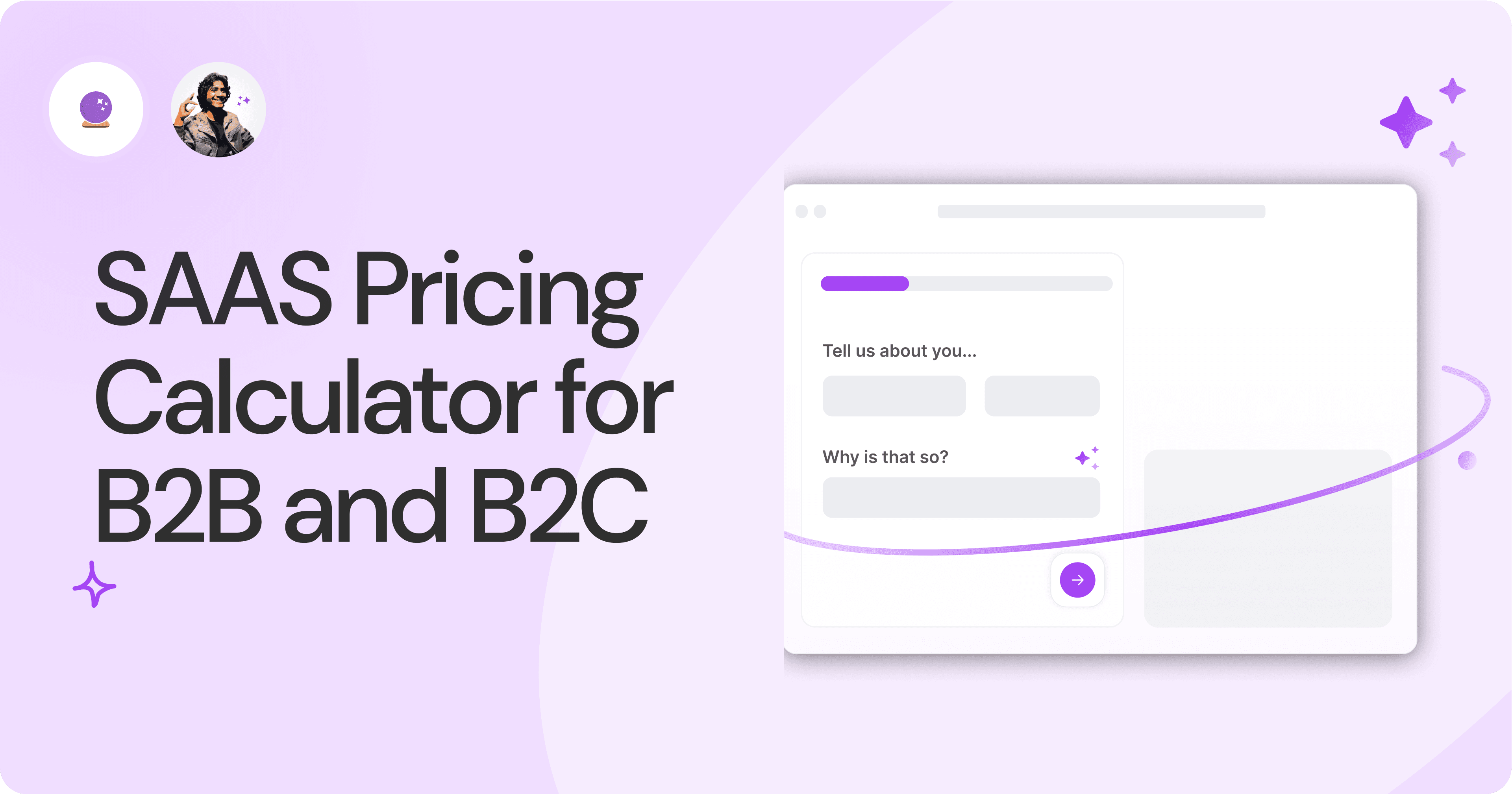
SAAS Pricing Calculators: B2B v B2C Online Forms.
The SaaS pricing calculator is an essential tool for both B2B and B2C SaaS companies. But how do you build it, right? We have you covered.
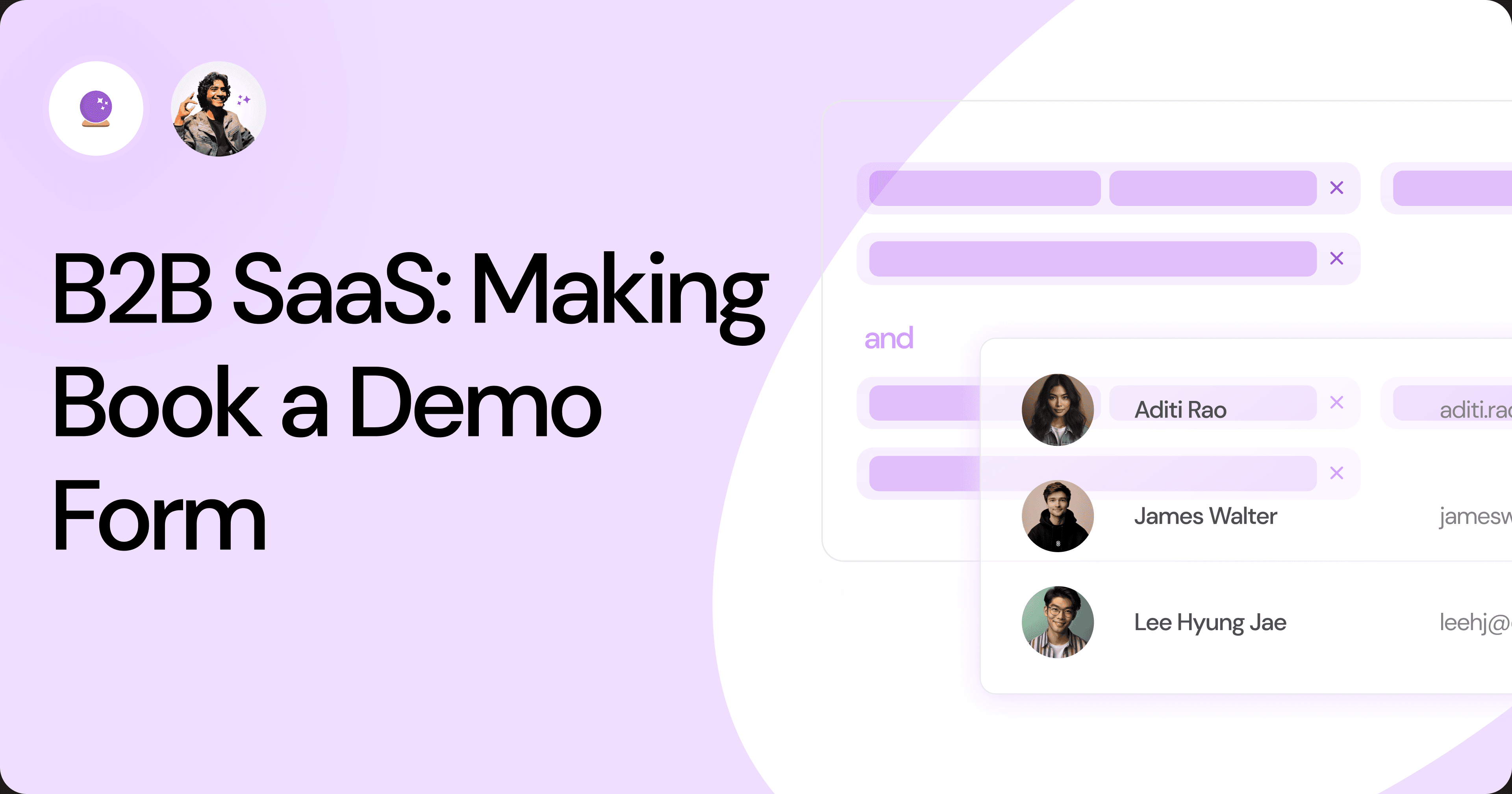
B2B SaaS: Making Book a Demo Form.
Having the perfect book a demo form for B2B SaaS is the first step in capturing leads. There are a few fundamental techniques to get this form right. Read on.

How to Get Started With SaaS Onboarding.
SaaS onboarding is essential for customer onboarding in B2B and B2C SaaS. Let’s understand its fundamentals, including the metrics.
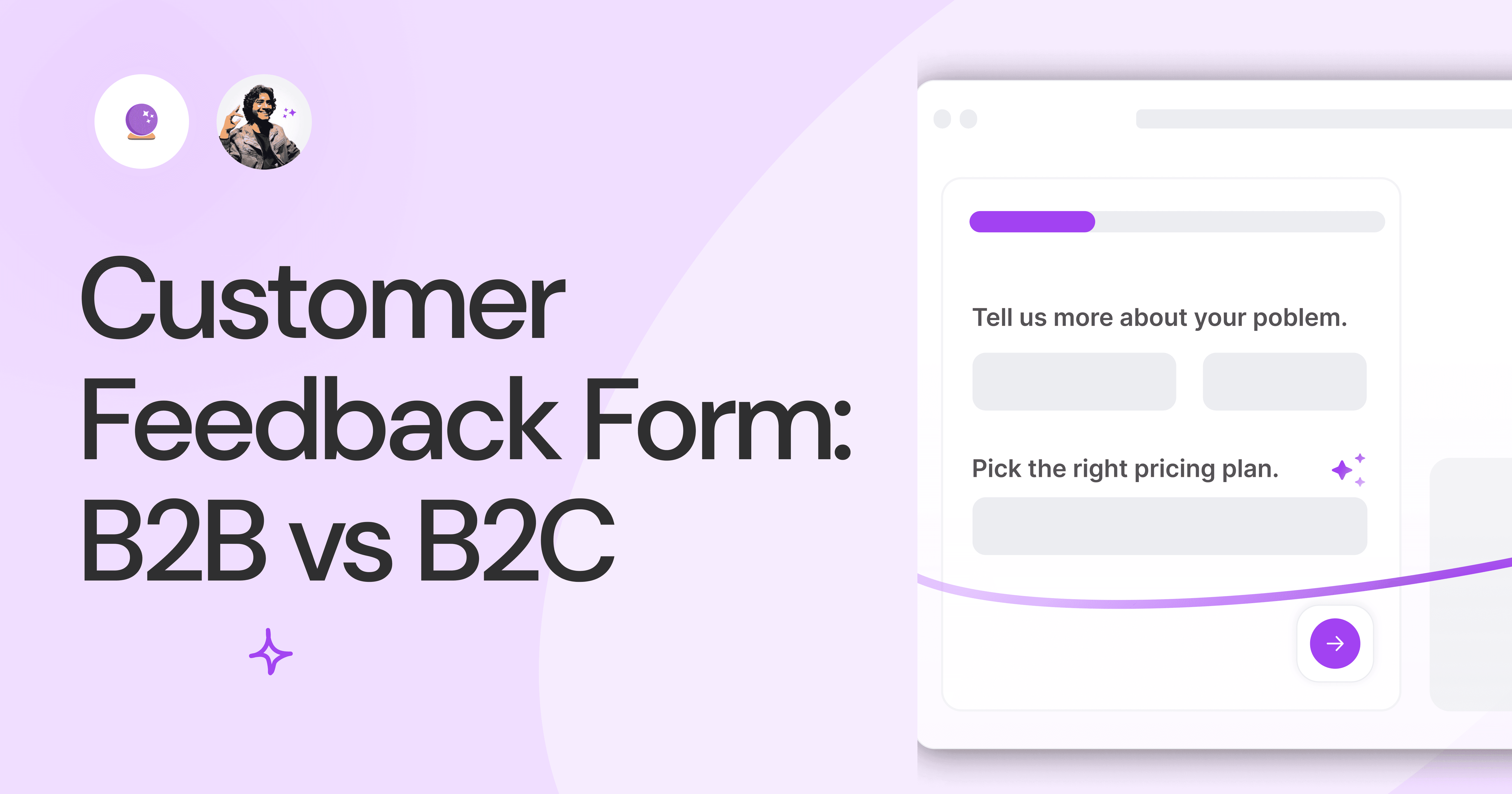
Customer Feedback Form: B2B vs B2C.
Why is customer feedback important? Because it dictates progress on B2B and B2B products and services for the customer to meet their goals.
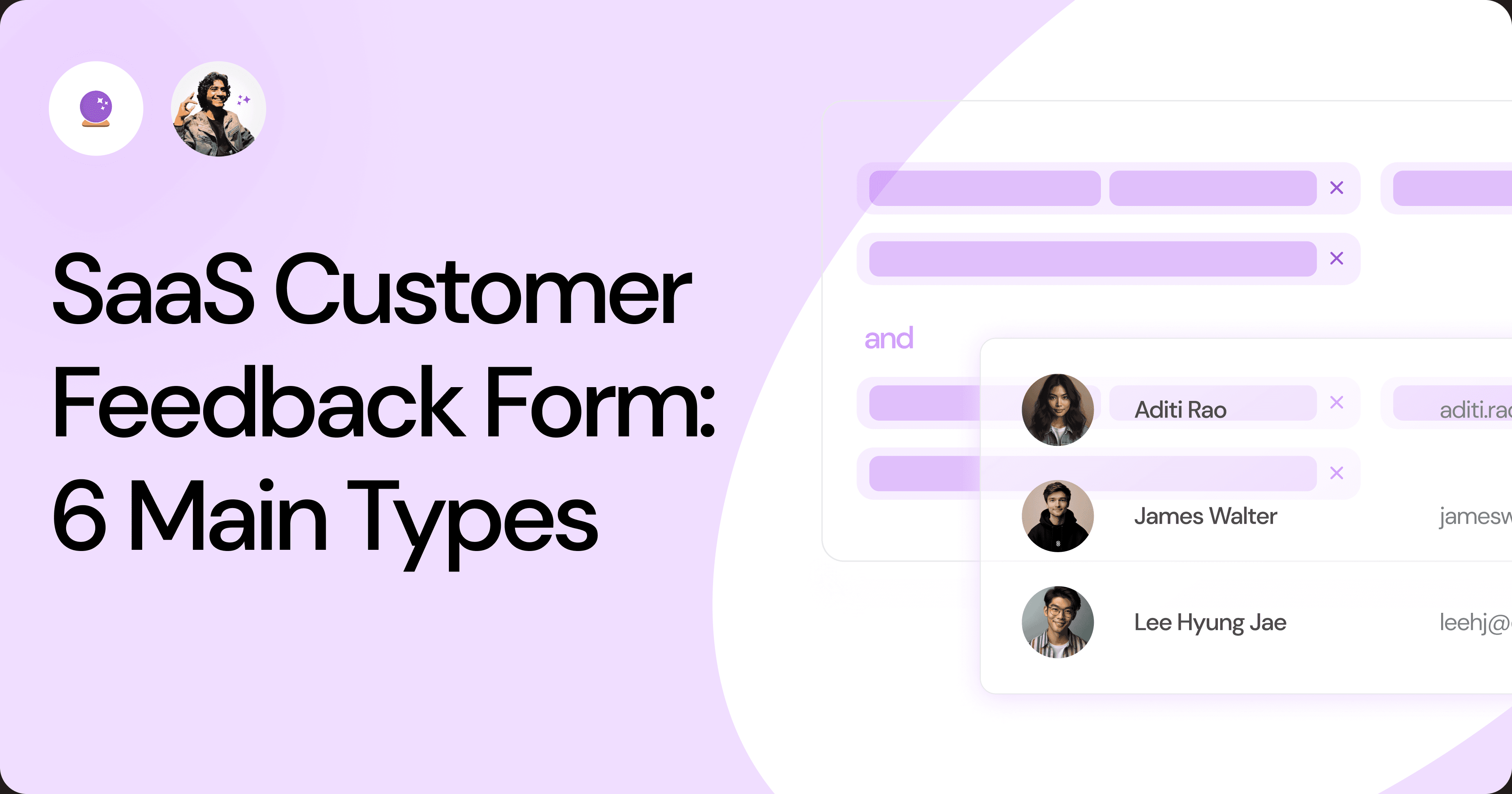
SaaS Customer Feedback Form: 6 Main Types.
As much as SaaS is self-serve, the role of a customer feedback form is highly relevant. There are different types, each with its use case and sections.
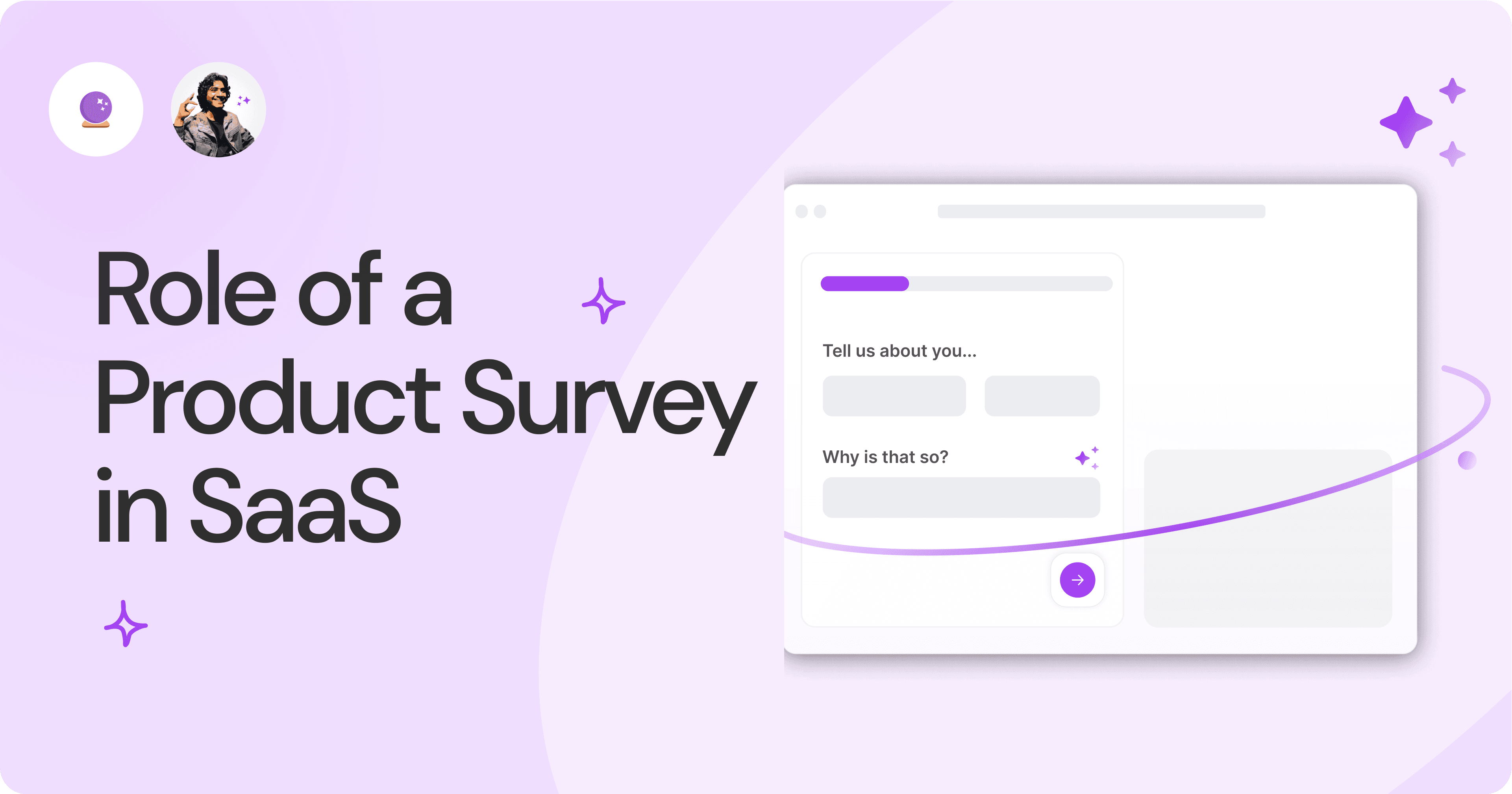
Role of a Product Survey in SaaS.
SaaS is all about creating products for specific use cases. This is where a product survey becomes all the more important to know the user deeply.

Should You Do a SaaS Market Survey?
Every SaaS company wants to grow fast. But without a market survey, growth isn't possible or sustainable. Let’s see how to do a market survey.

SAAS Pricing Calculators: B2B v B2C Online Forms.
The SaaS pricing calculator is an essential tool for both B2B and B2C SaaS companies. But how do you build it, right? We have you covered.

B2B SaaS: Making Book a Demo Form.
Having the perfect book a demo form for B2B SaaS is the first step in capturing leads. There are a few fundamental techniques to get this form right. Read on.

How to Get Started With SaaS Onboarding.
SaaS onboarding is essential for customer onboarding in B2B and B2C SaaS. Let’s understand its fundamentals, including the metrics.

Customer Feedback Form: B2B vs B2C.
Why is customer feedback important? Because it dictates progress on B2B and B2B products and services for the customer to meet their goals.

SaaS Customer Feedback Form: 6 Main Types.
As much as SaaS is self-serve, the role of a customer feedback form is highly relevant. There are different types, each with its use case and sections.

Role of a Product Survey in SaaS.
SaaS is all about creating products for specific use cases. This is where a product survey becomes all the more important to know the user deeply.

Should You Do a SaaS Market Survey?
Every SaaS company wants to grow fast. But without a market survey, growth isn't possible or sustainable. Let’s see how to do a market survey.

SAAS Pricing Calculators: B2B v B2C Online Forms.
The SaaS pricing calculator is an essential tool for both B2B and B2C SaaS companies. But how do you build it, right? We have you covered.

B2B SaaS: Making Book a Demo Form.
Having the perfect book a demo form for B2B SaaS is the first step in capturing leads. There are a few fundamental techniques to get this form right. Read on.

How to Get Started With SaaS Onboarding.
SaaS onboarding is essential for customer onboarding in B2B and B2C SaaS. Let’s understand its fundamentals, including the metrics.

Customer Feedback Form: B2B vs B2C.
Why is customer feedback important? Because it dictates progress on B2B and B2B products and services for the customer to meet their goals.

SaaS Customer Feedback Form: 6 Main Types.
As much as SaaS is self-serve, the role of a customer feedback form is highly relevant. There are different types, each with its use case and sections.

Role of a Product Survey in SaaS.
SaaS is all about creating products for specific use cases. This is where a product survey becomes all the more important to know the user deeply.

Should You Do a SaaS Market Survey?
Every SaaS company wants to grow fast. But without a market survey, growth isn't possible or sustainable. Let’s see how to do a market survey.

Nine Types of Healthcare and Medical Forms.
Medical forms are a must-have for any healthcare business or practitioner. Learn about the different kinds of medical and healthcare forms.
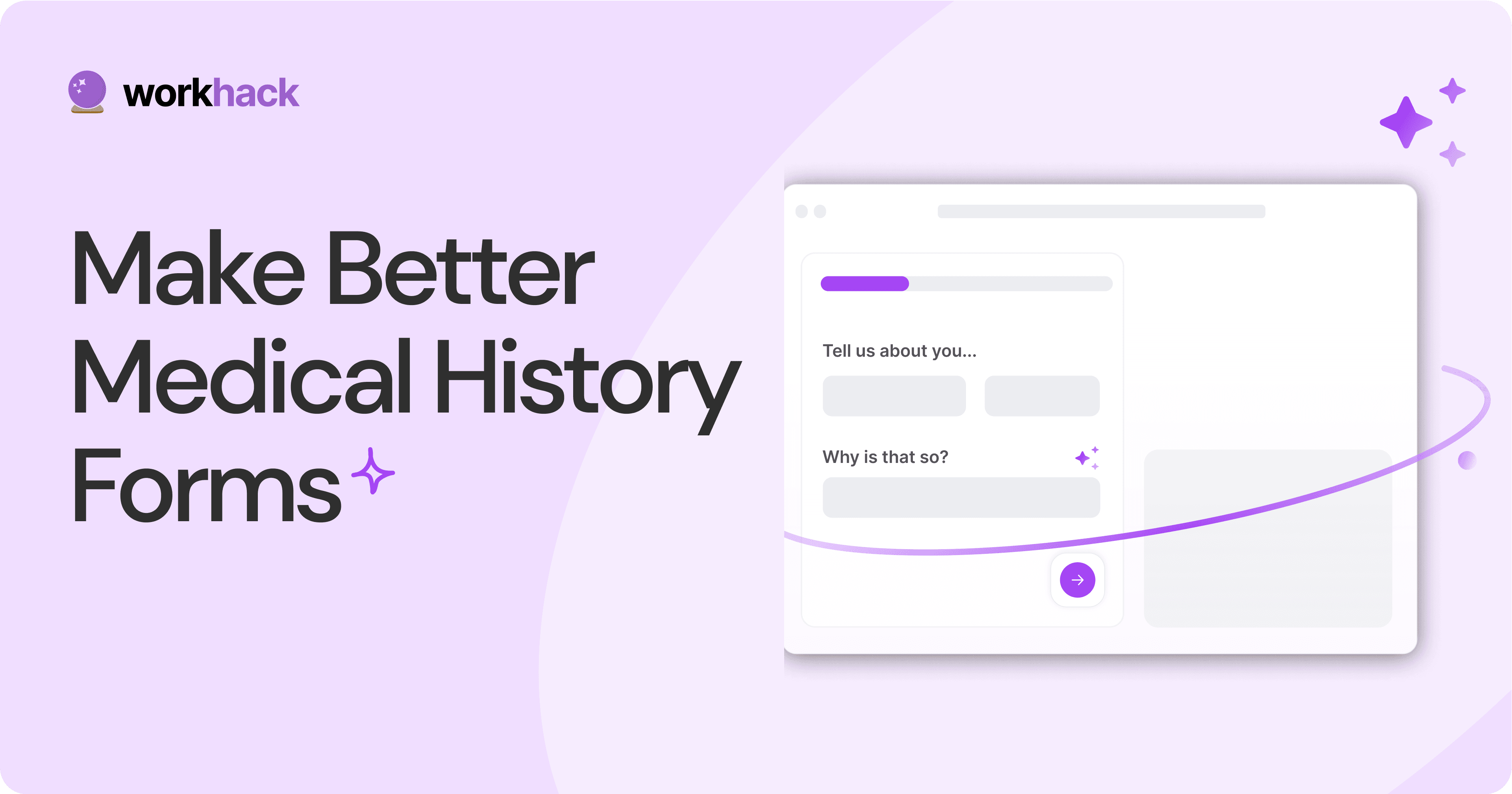
4 Tips for Better Medical History Forms.
Medical history forms are central to patient care, onboarding, and medical administration records. Learn how to make them easier to fill.
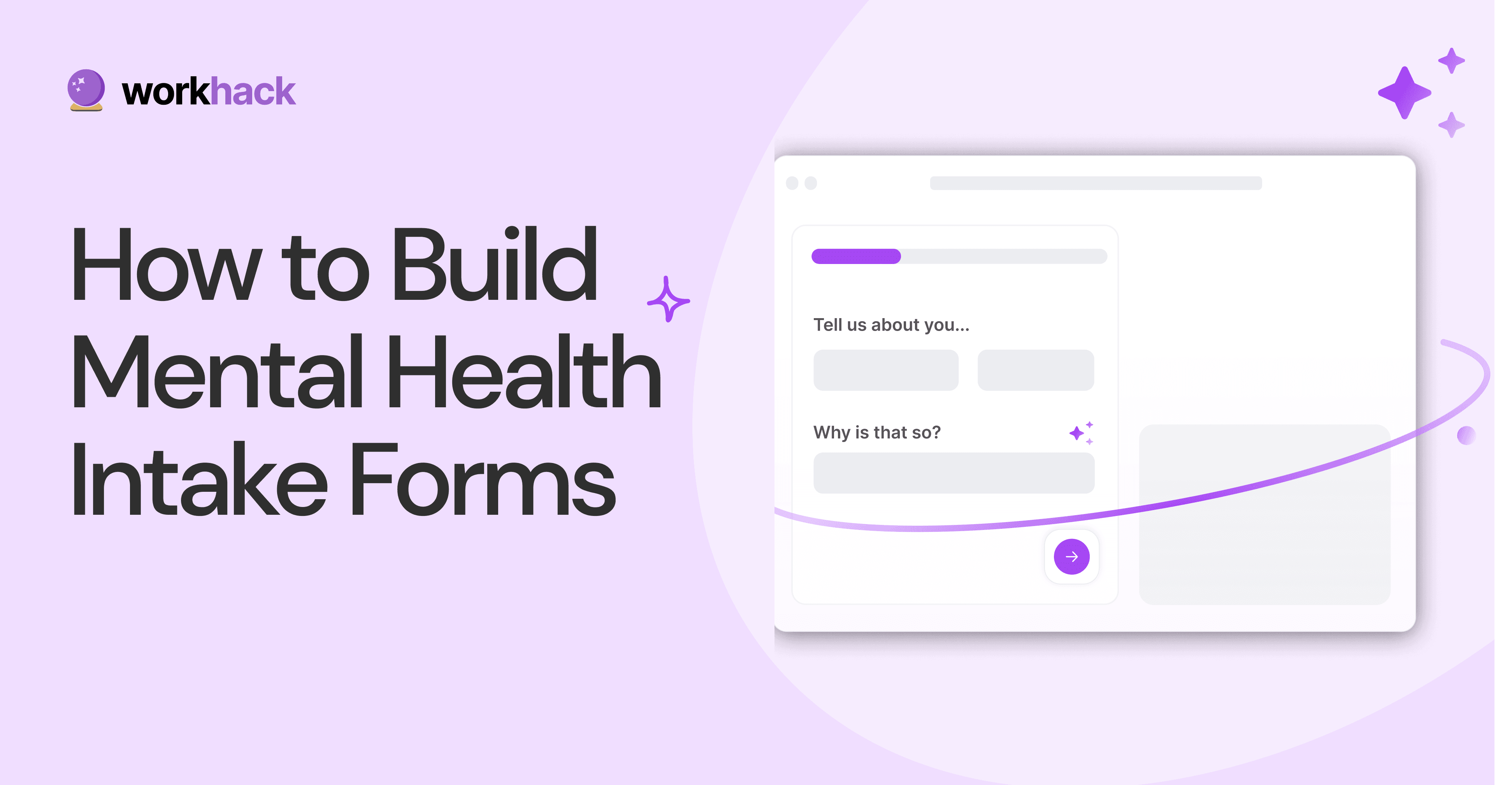
How to Build Mental Health Intake Forms?
Mental health intake forms are not like patient intake forms. Mental health intake forms deal with far more sensitive data and have specific design methods.
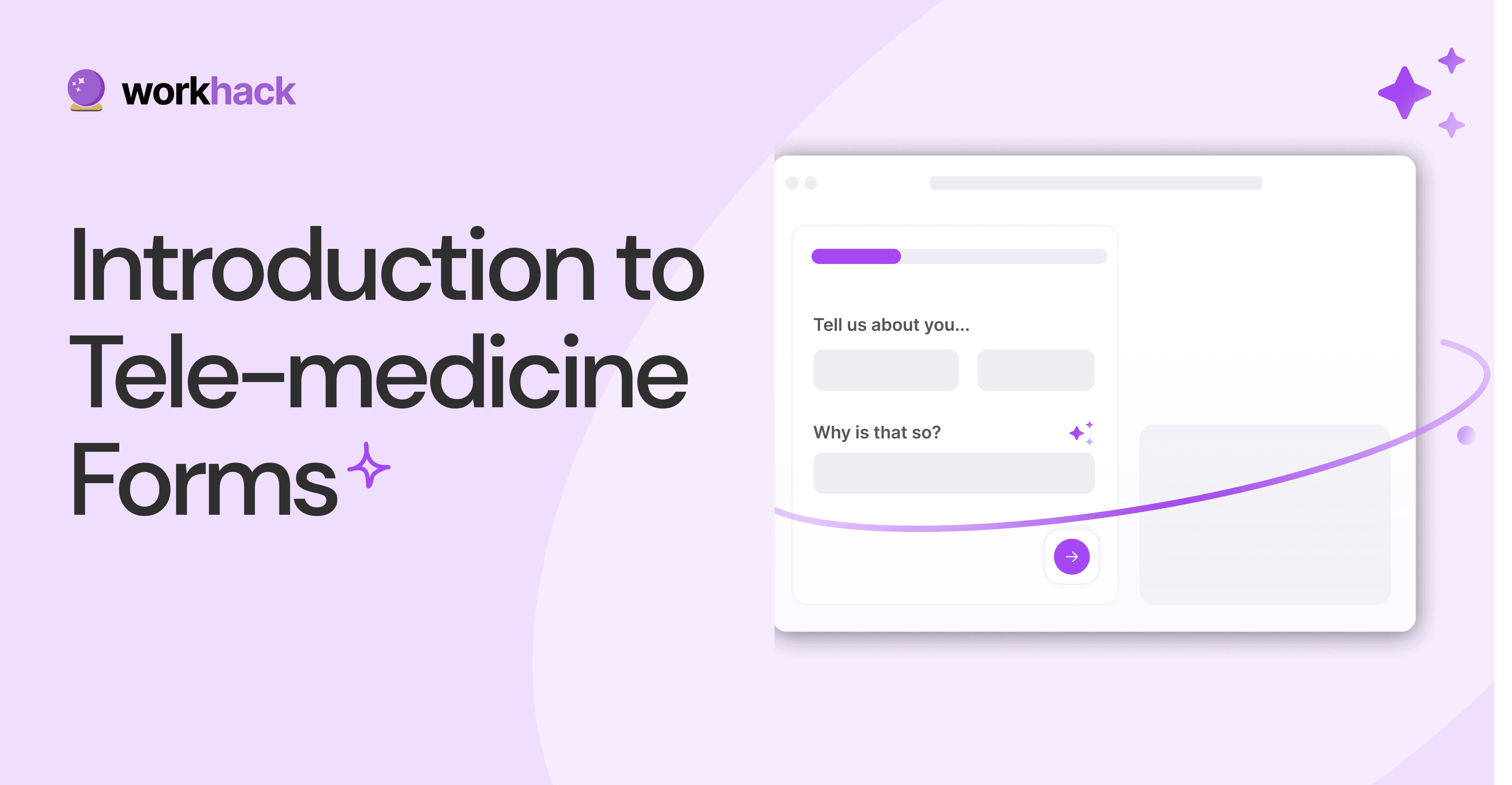
What, Why and How of Telemedicine Forms.
Telemedicine is on the rise and with different form builders out there, which one best suits your needs as a healthcare services provider?
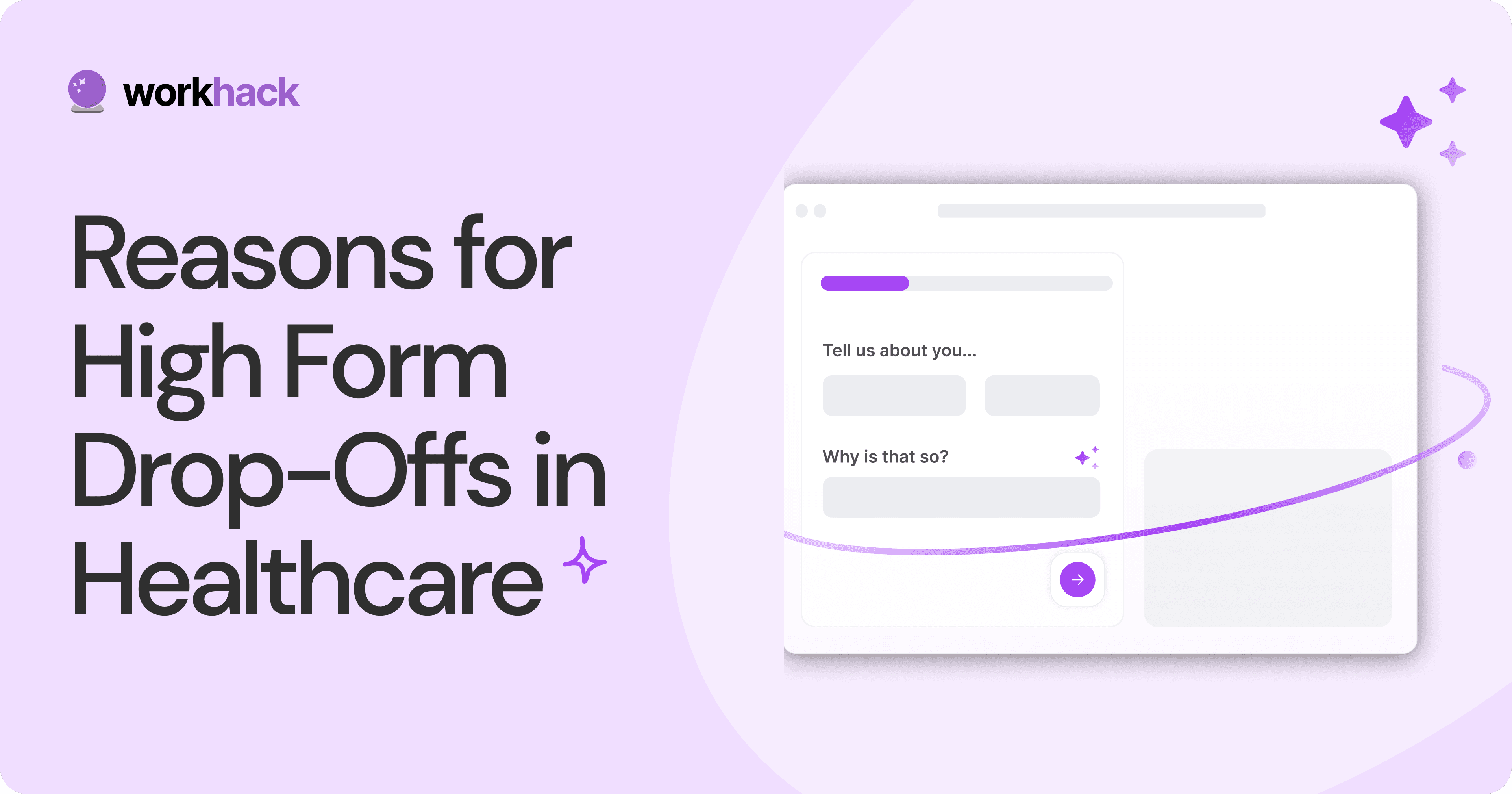
3 Reasons for Major Drop-Offs in Medical Forms.
No matter which healthcare form we pick, there are major drop-off reasons. We shall dive into the top 3 and learn how to resolve them in your next form.
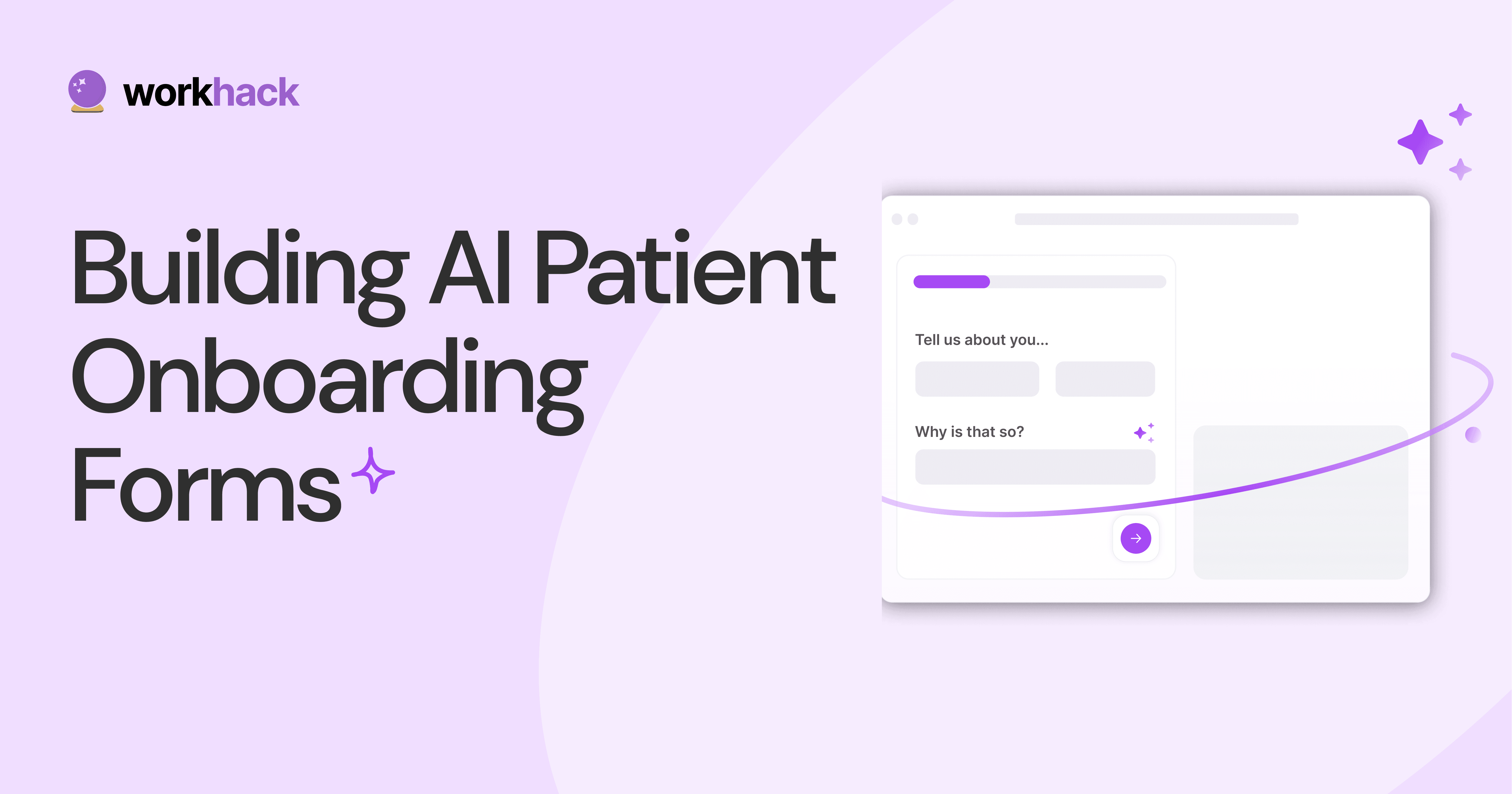
Patient Onboarding Forms - From Click to Clinic.
Patient onboarding forms are the first touchpoint for patients; getting this right for higher conversion rates is a must-have. Learn how to perfect them now.
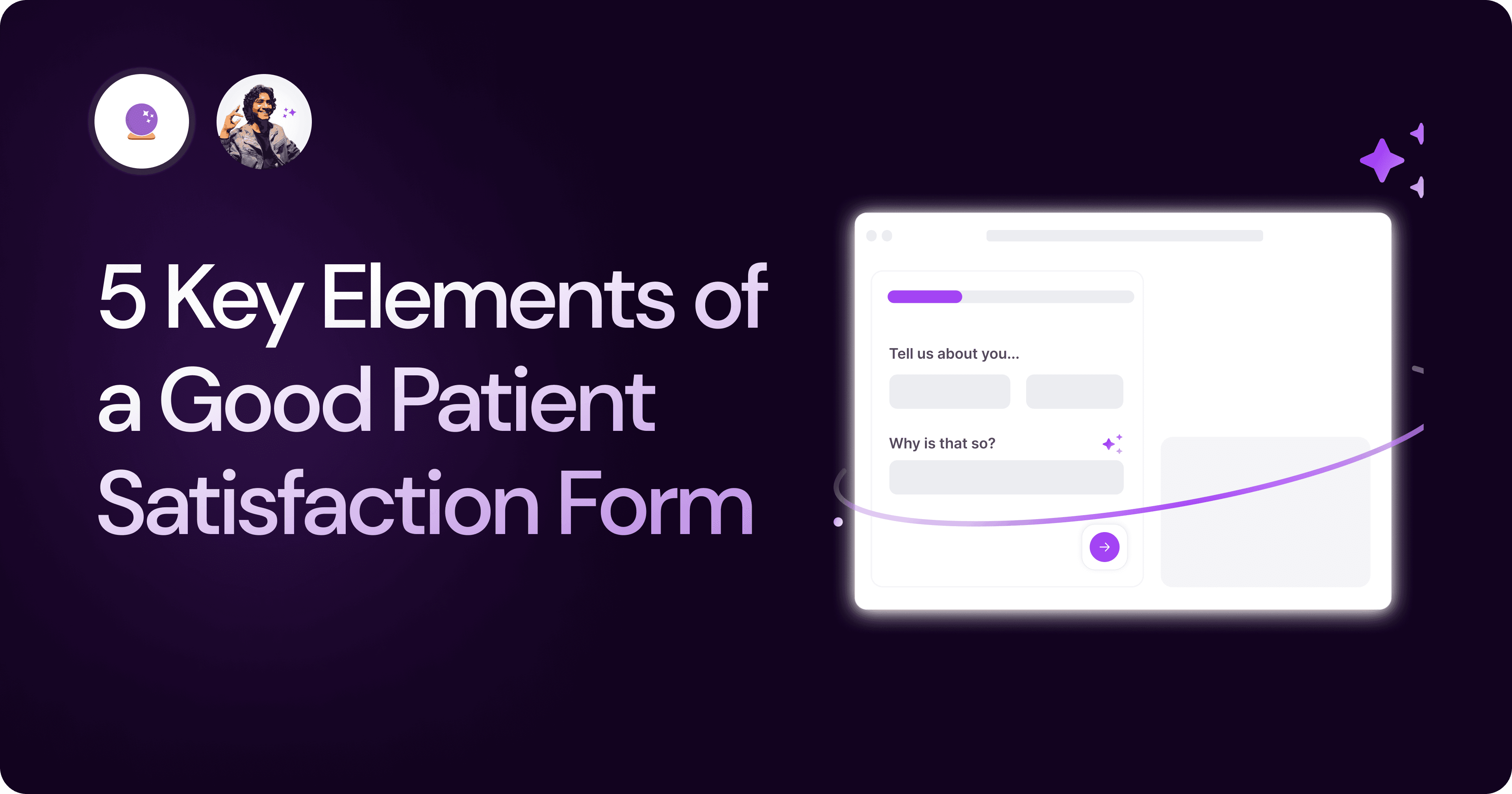
5 Key Parts of a Good Patient Satisfaction Form.
The goal of patient satisfaction surveys is to course-correct the services of a healthcare provider. Patient feedback leads to a culture of patient-centric care.
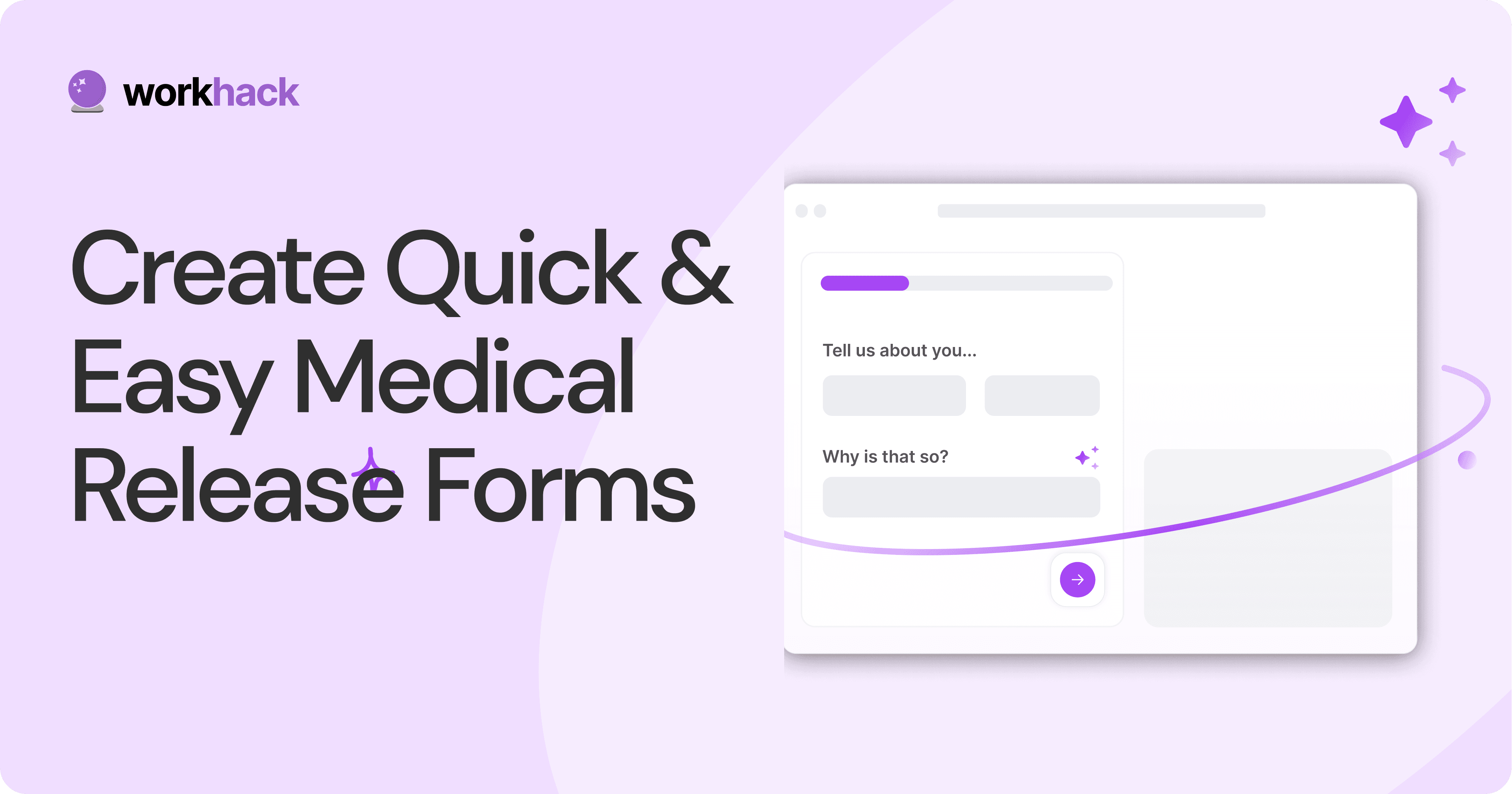
Build Quick and Easy Medical Release Forms.
Every HIPAA-compliant healthcare provider comes across medical release forms that involve details from medical history forms. Can they be shipped fast? Yes.

SAAS Pricing Calculators: B2B v B2C Online Forms.
The SaaS pricing calculator is an essential tool for both B2B and B2C SaaS companies. But how do you build it, right? We have you covered.

B2B SaaS: Making Book a Demo Form.
Having the perfect book a demo form for B2B SaaS is the first step in capturing leads. There are a few fundamental techniques to get this form right. Read on.

How to Get Started With SaaS Onboarding.
SaaS onboarding is essential for customer onboarding in B2B and B2C SaaS. Let’s understand its fundamentals, including the metrics.

Customer Feedback Form: B2B vs B2C.
Why is customer feedback important? Because it dictates progress on B2B and B2B products and services for the customer to meet their goals.

SaaS Customer Feedback Form: 6 Main Types.
As much as SaaS is self-serve, the role of a customer feedback form is highly relevant. There are different types, each with its use case and sections.

Role of a Product Survey in SaaS.
SaaS is all about creating products for specific use cases. This is where a product survey becomes all the more important to know the user deeply.

Should You Do a SaaS Market Survey?
Every SaaS company wants to grow fast. But without a market survey, growth isn't possible or sustainable. Let’s see how to do a market survey.
Subscribe to stay updated.
Subscribe to stay updated.
Subscribe to stay updated.
HC

HC

HC

HC

70+ people from across industries read our emails.
HC

HC

70+ people from across industries read our emails.
HC

HC

HC

70+ people from across industries read our emails.




Bangalore, India / San Francisco, US
WorkHack Inc. 2023
Bangalore, India
San Francisco, US
WorkHack Inc. 2023
WorkHack Inc. 2023
Bangalore, India / San Francisco, US
WorkHack Inc. 2023
Bangalore, India / San Francisco, US



